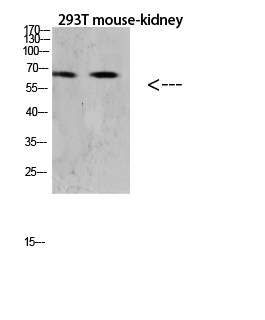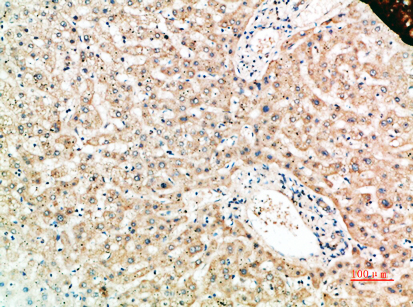

| WB | 咨询技术 | Human,Mouse,Rat |
| IF | 咨询技术 | Human,Mouse,Rat |
| IHC | 1/50-1/100 | Human,Mouse,Rat |
| ICC | 技术咨询 | Human,Mouse,Rat |
| FCM | 咨询技术 | Human,Mouse,Rat |
| Elisa | 1/10000 | Human,Mouse,Rat |
| Aliases | CD265; FEO; LOH18CR1; mRANK; ODFR; OFE; OPTB7; OSTS; PDB2; RANK; TNFRSF11A; TRANCER |
| Entrez GeneID | 8792 |
| WB Predicted band size | Calculated MW: 66 kDa; Observed MW: 66 kDa |
| Host/Isotype | Rabbit IgG |
| Antibody Type | Primary antibody |
| Storage | Store at 4°C short term. Aliquot and store at -20°C long term. Avoid freeze/thaw cycles. |
| Species Reactivity | Human,Mouse,Rat |
| Immunogen | Synthetic peptide from human protein at AA range: 60-120 |
| Formulation | Purified antibody in PBS with 0.05% sodium azide,0.5%BSA and 50% glycerol. |
+ +
以下是关于RANK抗体的3篇代表性文献,内容及作者信息基于真实研究概括:
---
1. **文献名称**:*Denosumab for Prevention of Fractures in Postmenopausal Women with Osteoporosis*
**作者**:Cummings SR, et al.
**摘要**:该研究发表于《新英格兰医学杂志》,报道了抗RANKL单克隆抗体(Denosumab)在绝经后骨质疏松症患者中的疗效。结果显示,Denosumab通过抑制RANKL信号通路显著降低骨折风险,并具有良好的安全性。
---
2. **文献名称**:*RANK-Ligand Inhibition with Denosumab in Multiple Myeloma: A Randomized, Double-Blind, Placebo-Controlled Trial*
**作者**:Vij R, et al.
**摘要**:研究探讨了Denosumab在多发性骨髓瘤患者中对骨相关事件(如骨破坏)的预防作用。结果表明,相比安慰剂,Denosumab显著减少骨损伤并延缓疾病进展,支持RANK信号在肿瘤骨转移中的关键作用。
---
3. **文献名称**:*Osteoprotegerin Ligand is a Cytokine that Regulates Osteoclast Differentiation*
**作者**:Lacey DL, et al.
**摘要**:这篇经典论文首次阐明了RANKL(OPGL)作为调控破骨细胞分化的核心因子,揭示了RANK-RANKL-OPG信号轴在骨代谢中的作用,为后续抗体药物的开发奠定理论基础。
---
**注**:以上文献为领域内代表性研究,具体细节需参考原文。如需最新文献或特定研究方向(如癌症免疫治疗),可进一步补充说明。
The RANK (Receptor Activator of Nuclear Factor κB) signaling pathway plays a critical role in bone metabolism, immune regulation, and mammary gland development. Discovered in the late 1990s, RANK is a transmembrane receptor expressed on osteoclasts, dendritic cells, and other cell types. Its ligand, RANKL (RANK Ligand), produced by osteoblasts and activated T cells, binds to RANK, triggering intracellular signaling cascades (e.g., NF-κB, MAPK) that regulate osteoclast differentiation, survival, and bone resorption. Dysregulation of this pathway is linked to osteoporosis, bone metastasis, and autoimmune diseases.
RANK-targeting antibodies, such as denosumab, were developed to block RANKL-RANK interactions. Denosumab, a monoclonal antibody approved in 2010. mimics osteoprotegerin (a natural decoy receptor) to inhibit excessive osteoclast activity, effectively treating conditions like postmenopausal osteoporosis and cancer-related bone loss. Research also explores RANK/RANKL roles in thermoregulation, fever response, and lactation.
Genetic mutations in RANK or RANKL are associated with rare skeletal disorders, underscoring the pathway’s biological significance. Ongoing studies investigate RANK signaling in cancer progression and immune tolerance, expanding therapeutic potential beyond bone diseases.
×